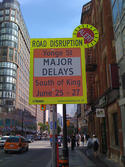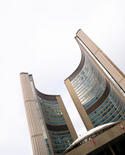Excerpts from Steve Lafleur's personal "View From The Wreckage" diary and photo log from this month's G20 conference in Toronto:
June 25th
10:51 PM: I arrive in Toronto to a surprisingly vacant parking lot on the Esplanade, in the heart of Toronto's bustling financial district. Quietest Friday night I've ever seen in Toronto. Barely a soul out in the usually packed financial district. read more »




















